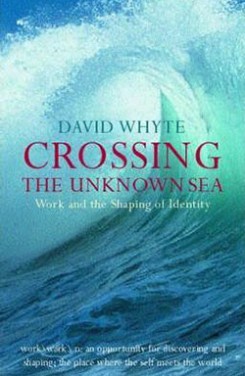Crossing the Unknown Sea: Work as a pilgrimage of identity
- Author: David Whyte
- Year of publication: 2001
- Fiction / non: Non-fiction
- Recent / classic: Recent release
- Primary Category: Business
- Additional categories: Self-help, Business
This book would appeal to you if
you are searching for greater meaning in your career, if you seek to develop a better work/life balance, or if you are intrigued by the statement, ‘If you want to meet terrifying silence, tell the world that you are going full-time as a poet.’
You probably wouldn't like this book if
you have no appreciation of whimsy.
The key themes of this book are
The relationship between work and identity
The relationship between life, work and time
The role of imagination in work
How identity is forged in relation to work
The writing style is
lucid and poetic.This book is recommended as therapy because
it examines issues relating to work and identity in a profound way.
It is extremely thought-provoking and broad-ranging in its discussions about work and its relationship to meaning and life satisfaction, as well as how to ensure that work doesn’t overtake other areas of meaning in your life.
Quotes
‘To have a firm persuasion in our work—to feel that what we do is right for ourselves and good for the world at exactly the same time—is one of the great triumphs of human existence.’ Page 4
‘That’s suicide … You get stuck and it’s time to move on, but you make the simple mistake of thinking you have to kill yourself to do it.’ Page 19
‘Often, in order to stay alive, we have to unmake a living in order to get back to living the life we wanted for ourselves. It is this cycle of making, disintegration, and remaking that is the hallmark of meaningful and creative work.’ Page 77
‘Our work is a measure not only of our own lives but of all those who came before us and created the world we inherit. I hope they did not labor, starve, bear innumerable children, nor cross oceans to make a new life so we could give it all up in the promised land by some bland acquiescence to corporate career safety.’ Page 92.
‘We have the strange idea, unsupported by any evidence, that we are loved and admired only for our superb strength, our far-reaching powers, and our all-knowing competency. Yet in the real world, no matter how many relationships have been initiated by strength and power, no marriage or friendship has ever been deepened by these qualities.’ Page 128
‘One of the distinguishing features of any courageous human being is the ability to remain unutterably themselves in the midst of conforming pressures. The surprising realization is that our friends can try and make us conform as much as our worst enemies. The excuses to fall away, to lose courage, to be other than ourselves are ever present and incredibly intimate.’ Page 165
‘To make friends with the hours is to come to know all the hidden correspondences inside our own bodies that match the richness and movement of the life we see around us. The tragedy of constant scheduling in our work is its mechanical effect on the hours, and subsequently on our bodies, reducing the spectrum of our individual character and colour to a grey sameness.’ Page 179
‘Reality is the conversation between ourselves and the never-ending productions of time.’ Page 180

